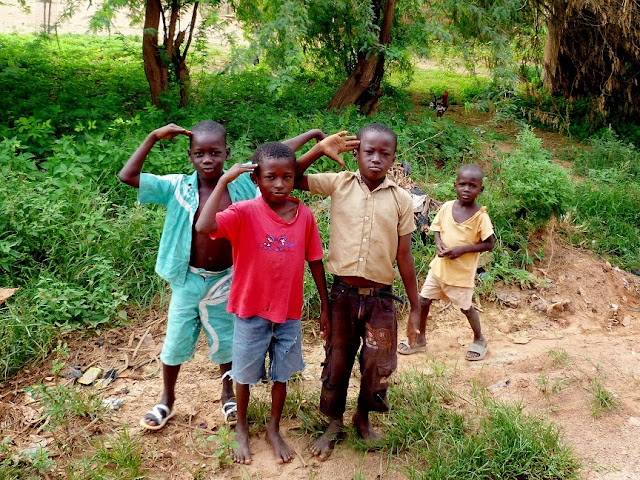It seems most
Burkinabé (well at least amongst the main ethnicity, the Mossi) believe in
genies. Genies live in a parallel universe and are all around us, even though
we are not able to see them. They live like us but are able to see things that
humans do not. They can predict the future and have the capacity to teleport
physical objects across continents. Indeed, at one time they were visible and humans
treated them as slaves. An interesting belief also attributes wet dreams to
genies. If a single genie lady sees you and is attracted by you, you will dream
of her making love to you (I refer to this as 'genie rape'). Particularly in villages,
where the toilet and shower (laitrine) is open air, men will only have showers before
9pm (in certain villages - and not necessarily far from urban centres - this is
a rule). If not, the lustful genie ladies on the prowl will see the nude human man
and take him during the night. Many also believe that white people are genies,
and that other genies helped white people to invent the aeroplane and the
telephone. It is believed that aeroplanes need gold (either on board or mixed into
the fabric) to fly. If there is no gold, the gold-loving genies will not allow
the plane to take off. Some humans have the ability to communicate with genies.
Through such conversations they can learn of the future, and I have been told
of instances where Burkinabé making the pilgrimage to Mecca have travelled
without flying thanks to the powers of the genies.
The recent
solar eclipse gave more insights into how Burkinabé see the world. Many were
fascinated, others were scared, with many people staying inside the whole day. During
the eve of the eclipse, I was speaking to a local shop owner in the sleepy town
of Houndé in the west of the country. He wondered whether other people in the
world were also able to see the eclipse. I confirmed that they would. He then
wondered whether we were all looking at the same sun. I confirmed that we were.
He then wondered if he could reach the sun if he climbed to the top of a high
mountain. On this occasion I had to disappoint him and attempt to explain the
whole concept of space in extremely simplified French in a few minutes. Many
Burkinabé are educated, particularly in the cities. But in an extremely
underdeveloped country where people are raised in villages in a certain
reality, we cannot always assume we share the same ingrained assumptions about
our universe, nor that our beliefs are necessarily more true than theirs.
It
is a fantastic experience getting to know the locals here - to exchange and to
learn about each others' cultures. There are so many similarities in the ways
we live and our attitudes that it can be shocking (sometimes in the negative
sense and others simply in terms of the fascination) to then find other areas -
such as gender equality, sexuality and magic - where attitudes are completely
at odds. But this is why three months of volunteering in Africa is just not nearly
enough. I've only scratched the surface.
 |
| Photo: 'Dolo': millet-based alcohol at 20p/litre |
 |
| Photo: l'accueil des gens d'Houndé |
 |
| Photo: Walking salesman in Bobo-Dioulasso |

















